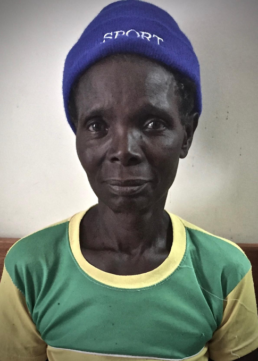
Miriam
A woman's story.
Miriam is a 52-year old refugee from the Democratic Republic of Congo, who fled to Uganda in a period of turmoil in her home country. Overcoming tremendous obstacles, Miriam safely made it to Uganda, and found a new home in a refugee camp. However, Miriam knew something was wrong when she felt her uterus protruding and bulging outside of her body, but was unable to access adequate health services for this issue.
“It is now 4 years [since I came to Uganda],” said Miriam. “I was trying to rescue [myself and my family] from the rebels who were just killing innocent people [in DRC]. I came [to Uganda] with very many other refugees, with my husband, family friend, and the children. When I came, I reached to Kyangwali [Refugee Camp], and got what little the government was giving [me]. I was not able to get health services in the refugee camp.”
After going months without help, Miriam finally came to MFH’s 2016 fistula camp at MUST seeking repair for prolapse. She traveled 8 hours to MUST from the refugee camp where she lives. Every year, shortly before the fistula camp begins, Dr. Kayondo, MUST Attending OB/GYN and Fistula Camp Physician, Maurice Muhire, Fistula Camp Coordinator, and MUST fellows travel to nearby refugee camps to screen eligible patients for the fistula camp. Last year, the MUST team was able to travel 8 hours to the Kyangwali Refugee Camp in Hoima, where they met women like Miriam. They brought her and others back to MUST, where MFH provided all lodging and medical expenses, so that these women could finally get the care they needed.
For Miriam, getting proper treatment was a final obstacle that needed to be overcome, after so many that she had already faced. Miriam, like so many of MFH’s patients, demonstrated a level of strength and perseverance throughout it all- after having to leave her home, after being forced to leave everything behind, and after searching for medical care. Miriam has come so far on her journey to rebuilding her life; it is MFH’s hope that Miriam’s treatment for prolapse can empower her even further.
“I feel happy after getting surgery,” Miriam said. “I feel happy because I can now sit with the rest of the women. During that time, when I still had the same problem [of prolapse], I [could not] have any talk[s] with the rest of the women. I would not even come close to sit with them.”
A returned sense of happiness, normalcy, and social reintegration: This is what drives the work of MFH.

